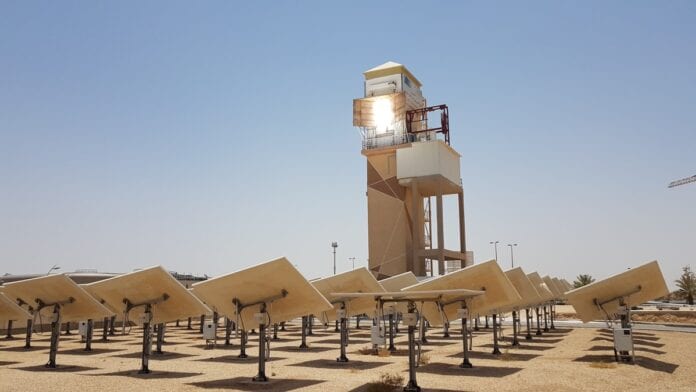The Horizon 2020 project DESOLINATION has started on June 1st, 2021 and will last 48 months until May 2025. During this time, innovative technologies related to both concentrated solar power and desalination will be designed to improve the efficiency of existing concepts. Not only will improvement be made on the independent systems but also on their coupling taking advantage of the mutual interactions and potentialities. The final demonstration system will be a 2 MWel power plant built in Saudi Arabia bringing together two promising technologies associated for the first time to reach unprecedented efficiencies.
DESOLINATION focuses on the Gulf Cooperation Council (GCC) region to test and deploy its technology and in particular this first prototype to be built on the premises of King Saud University in Riyadh, Saudi Arabia. With high solar resources and high demand for desalinated water, it is expected that the DESOLINATION prototype will provide low-cost renewable electricity (<90€/MWh) and low-cost fresh water (<0.9€/m3), matching the countries’ requirements for efficient and accessible production of water. Apart from these parameters, the final system will also benefit from a substantial reduction of CO2 emissions from traditional desalination systems: 30% reduction with respect to forward osmosis systems, 40% reduction with respect to reverse osmosis systems and 70% reduction with respect to thermal desalination systems.
DESOLINATION will innovate on different fronts. On the concentrated solar side, carbon dioxide blends will be the core of the innovation, leading to more efficient and less expensive power cycles and controllable parameters. On the water side, forward osmosis will be developed and linked to membrane distillation using the wasted heat of the power cycle to generate freshwater. Finally, a unique combination of the power and water cycles will allow the disruptive coupled system to work at high waste-heat-to-freshwater conversion efficiency.
Throughout the project, both EU and GCC countries will be collaborating to provide a high-level technological demonstrator. Indeed, DESOLINATION brings together some of the best experts in the world on concentrated solar power, carbon dioxide power cycle design, desalination processes, separation membranes and system integration to fulfil the project’s objectives of a strong market uptake potential after the end of the project. Composed of 19 partners from 9 EU countries and 3 GCC countries, the project includes 13 high-level universities and research centres (Politecnico di Milano, Fraunhofer Institute, Lund University, Cranfield University, Tekniker, Lappeenranta-Lahti University of Technology, University of Brescia, Technical University of Eindhoven, University of Maribor, Luleå University of Technology, King Saud University, University of Bahrain and German University of Technology) working alongside 3 industrials (Baker Hughes, Cobra and ACSP), and 3 SMEs (Protarget, Temisth and Euroquality).
This project has received funding from the European Union’s Horizon 2020 research and innovation programme under grant agreement No. 101022686 (DESOLINATION).
olitecnico di Milano is a scientific-technological university which trains engineers, architects and industrial designers.
The University has always focused on the quality and innovation of its teaching and research, developing a fruitful relationship with business and productive world by means of experimental research and technological transfer.
Research has always been linked to didactics and it is a priority commitment which has allowed Politecnico Milano to achieve high quality results at an international level as to join the university to the business world. Research constitutes a parallel path to that formed by cooperation and alliances with the industrial system.
Knowing the world in which you are going to work is a vital requirement for training students. By referring back to the needs of the industrial world and public administration, research is facilitated in following new paths and dealing with the need for constant and rapid innovation. The alliance with the industrial world, in many cases favored by Fondazione Politecnico and by consortiums to which Politecnico belong, allows the university to follow the vocation of the territories in which it operates and to be a stimulus for their development.
The challenge which is being met today projects this tradition which is strongly rooted in the territory beyond the borders of the country, in a relationship which is developing first of all at the European level with the objective of contributing to the creation of a single professional training market. Politecnico takes part in several research, sites and training projects collaborating with the most qualified European universities. Politecnico’s contribution is increasingly being extended to other countries: from North America to Southeast Asia to Eastern Europe. Today the drive to internationalization sees Politecnico Milano taking part into the European and world network of leading technical universities and it offers several courses beside many which are entirely taught in English.

| [donate]
| Help keep news FREE for our readersSupporting your local community newspaper/online news outlet is crucial now more than ever. If you believe in independent journalism,then consider making a valuable contribution by making a one-time or monthly donation. We operate in rural areas where providing unbiased news can be challenging. |
















